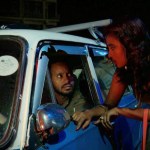Reviews
Which Android Tablet Is Best?
You will have to decide which tablet is best for you based on your specific needs, and no general review is going to give you that information in a useful way. But, among the many tablets there is a handful that rise to the top and should be looked at either to consider purchasing or to use as a benchmark against which to measure others.
Here is some guidance to help you decide which Android tablet are in that category, and that you should consider. Note that I look briefly at a very inexpensive option here (not included in the list below).
Nexus 9
Most of…
It's been a busy movie-going month for me with the Monsters of Film festival, where I saw six films, and now the Stockholm International Film Festival where I've seen eight. Last year I saw ten films at the latter festival, and I enjoyed most of them, but overall I liked this year's crop even better. All but two get my special recommendation:
As I Open My Eyes. A late-teen girl discovers love and experiences political repression while singing in a band in pre-revolution Tunis -- five years ago.
Dope. By happenstance three geeky straightlaced ghetto kids find themselves in possession of a…
Since I'm at Boskone, talking and listening to people talking about science fiction and fantasy literature, it seems appropriate to do a quickie post listing notworthy genre stuff I've read recently. There isn't that much of it, as I've been doing a lot of non-fiction reading, and also slightly preoccupied with book promotion. Still, I've been reading a few things while putting SteelyKid to bed, and might as well comment on them here:
The Alchemist's Apprentice, The Alchemist's Pursuit, and The Alchemist's Code by Dave Duncan. Duncan occupies a literary position similar to that of the late…
My review of Climate Cover-Up: The Crusade to Deny Global Warming is up at the Firedoglake book salon. It begins:
Question: What's the difference between a computer salesman and a used car salesman?
You'll have to click through to find out the answer.
I reviewed Freakonomics when it first came out and really liked it. So I was looking forward to the sequel Superfreakonomics. Unfortunately, Levitt and Dubner decided to write about global warming and have made a dreadful hash of it. The result is so wrong that it has even Joe Romm and William Connolley in agreement.
So what went wrong? One possibility is that Freakonomics was superficially plausible but also rubbish, and it was only when they wrote about an area where I was knowledgeable that I noticed. But I don't think this is the correct explanation. I've read the journal papers on…
Borgman, Christine L. Scholarship in the Digital Age: Information, Infrastructure, and the Internet. MIT Press, 2007. Worldcat page, Powell's page (no, I get no kickback).
This calm, clear volume provides a thorough grounding in the practices of academic researchers around their publications and their data, and how the Internet is—and in many cases, isn't—changing those practices.
Copiously researched, accurate, and logically presented, the book starts with a 30,000-foot overview of the current situation, then swoops through technology, law and policy, the existing scholarly-communication…
I made a run to the library last week on one of the days I was home with SteelyKid, as an excuse to get out of the house for a little while. I picked up three books: Counterknowledge, The Devil's Eye by Jack McDevitt (an Antiquities Dealers Innnnn Spaaaaaace novel, and a good example of Competence Fiction), and a pop-science book titled The Age of Entanglement: When Quantum Physics Came of Age by Louisa Gilder, because it looked fairly relevant to my own book-in-progress.
Amusingly, my RSS feeds yesterday brought me the latest in a series of posts in which ZapperZ waxes peevish about the book…
Some people, like Imelda Marcos and our new Dr. Isis, have a thing for fancy shoes.
I go crazy for gadgets.
technorati tags: iphone, DNA, molecules, molecular structure, molecular modeling, Science education
For my birthday this year, my family bought me a new iPhone! Yeah!
So, I've been killing several hours today filling it with cute little iPhone apps. Who knew one little phone could be so much fun?
One app, I enjoy, is called Molecules.
Molecules lets you download structure files from the Protein Data Bank (PDB) and play with the structures on your phone!
Spreading your fingers…
Masha Gessen was faced with a terrifying choice: cut off her breasts, and possibly save herself from cancer, or use them to feed her child.
It was late at night when I walked back to my empty dorm room at the conference. Shivering, I stood on the narrow bed, quickly shut the windows, tore the blankets off the other bed, and wrapped myself up, trying to get warm. Too cold to sleep, I picked up my copy of Masha Gessen's "Blood Matters: From Inherited Illness to Designer Babies, How the World and I Found Ourselves in the Future of the Gene," expecting boredom to lull me into unconsiousness…
One time, I suggested in a list-serve that science teachers make more use of primary scientific literature. Naturally, I learned all the reasons why teachers don't do this-lack of access being one of the biggies- but I also learned something surprising.
One teacher wrote that she re-writes a lot of research articles to make them easier for her students to read. I can understand that notion, in principle. My students struggle with scientific language, too, even those that have bachelor's degrees in biology.
What surprised me was thinking about the amount of time that activity would take!…
"Did you know," my friend whispered, "that the Humane Society funds terrorists?"
I was stunned. What? That's crazy! I've adopted pets from there. No way! How could those be the same people??
My friend and I were suffering from "brand confusion." In business, this happens when different companies use similar names for their products in order to confuse the marketplace. In the animal rights movement, brand confusion is used to misdirect the funds that would otherwise help groups who do genuine humanitarian work.
As I learned in "The Animal Research War" by P. Micheal Conn and James Parker…
I got my copy of "A short guide to the human genome" by Stewart Scherer today from Cold Spring Harbor Laboratory Press (2008, ISBN 978-087969791-4). Usually, I would wait until after I've read a book to write a review, but this book doesn't require that kind of study. As soon I skimmed through it and read some of the questions and answers, I knew this would be the kind of quick reference that I would like to have sitting above my desk.
Scherer has compiled a wonderful text that not only answers many of the kinds of questions that I can think to ask about the human genome, but the kinds of…
Genetics textbooks abound with stories of European royalty and the hazards of having children after you've married one of your cousins. It struck me as an interesting parallel that the lion is such a popular symbol in so many royal coats of arms. Like the royal families of Europe, certain lion populations have also suffered from a few too many copies of certain recessive genes.
I first read about the Florida panthers a few years ago while researching material for a class that I teach on using bioinformatics. It wasn't my first encounter with big cats and their DNA. Years before, while…
When purified, it glows with an unearthly light. You can't go "chemical free" and try to escape it. It's part of our bones and it forms the backbone of our DNA. A tool for good, a tool of war, essential for gardening, and infamous as a pesticide; phosphorus is truly an amazing element. Amazing too, are the stories about it's discovery and our history with using it. Many of the stories in The 13th Element by John Emsley (2000, John Wiley & Sons), from the alchemist's bench to the murderer's kitchen, are well-suited to reading on a Halloween eve.
From the nightmare inspiring stories…
For the record: Chlamydia is NOT a virus.
I am bummed. I like the little MicrobeWorld radio broadcasts, and the video podcasts are even more fun.
But I was perusing the archives and I found this:
I could ignore this if it came from a different source, but MicrobeWorld is produced with funding from the American Society for Microbiology!
Microbiologists are supposed to know the difference between bacteria and viruses. It's part of our training and big part of what we do.
I know, as scientists we're always supposed to follow the mantra of "buyer beware" and "be skeptical of…
Biology as a second-language: the immersion method
Language teachers say the best way to learn a language is by total immersion and even better, spending time in the country where it's spoken conversing with native speakers.
See it, hear it, speak it, use it!
Put yourself in a position where you must do these four things to survive (or at least find the restroom) and you will learn more rapidly than by any other method.
Graduate school serves a similar purpose for scientists. You go from an environment where your fellow students and co-workers spend time chatting about TV shows and…
Why the ABRF of course!
I spend a fair amount time every summer giving workshops for college and high-school teachers on genomics and bioinformatics. One of the things that always surprises them, is the amount of lab work that's carried out by people working in shared, or core lab facilities. For example, if I was working at a research university and I wanted to sequence some DNA, maybe several patient samples, or a bacterial genome, I would send the DNA to a core lab and they would send me the sequences. I would analyze the data and write the paper.
I've simplified that process a bit in…
Many medical conditions today are treated but never cured. Imagine, a child with a genetic disease like juvenile diabetes or hemophilia. This child will be taking expensive medications for their entire lives. In the case of some diseases the cost of the medications might be more than child or their parents can ever hope to earn in their lifetimes, much less spend on a life-saving drug.
This is one of the many reasons why people have placed such great hopes in gene therapy. If a disease results from a defective gene, and we could replace it or supplement it with a functional gene, perhaps we…
What do people in biotechnology do on the job?
What can students do with a science degree once they've finished college? Some answers can be found at the "Life Sciences Central web site. Created by the Workforce Development Council of Seattle-King County, this is a wonderful resource for anyone who's considering biotechnology for a potential career.
My favorite part of the site is the series of short video interviews from people in the biotech industry, describing what they do on the job and how they got there.
tags: biotechnology careers, biotechnology, career+descriptions
Ten interviews…
If we asked any biologist to pick the five most important techniques in biology, that list would certainly include PCR.
PCR stands for Polymerase Chain Reaction. It's used everywhere. We use it to amplify DNA for cloning, we use it for diagnostic tests, for DNA sequencing, for identifying pathogens, for identifying our long-lost relatives (and sometimes parents), and in forensics. If there's a technique that involves DNA, PCR is probably involved somewhere, too.
Since PCR is such an important technique, and we're going to be using PCR in our course, it's worth checking out a few…

